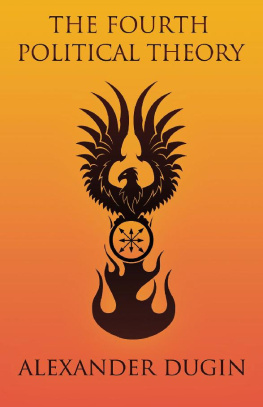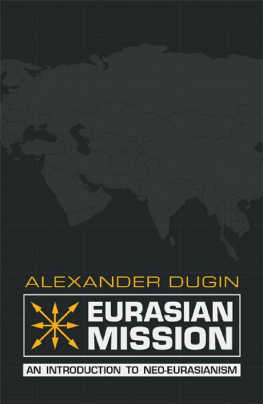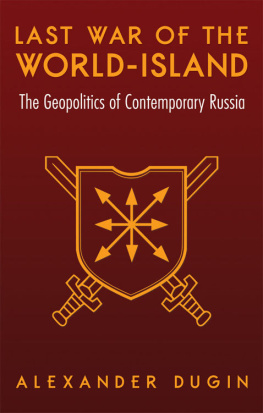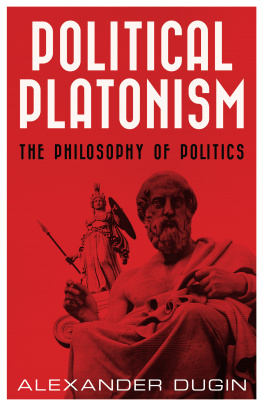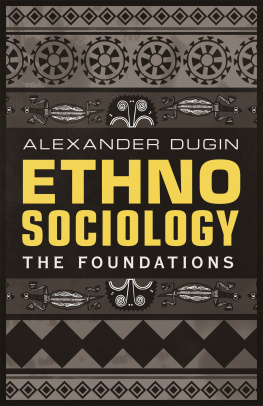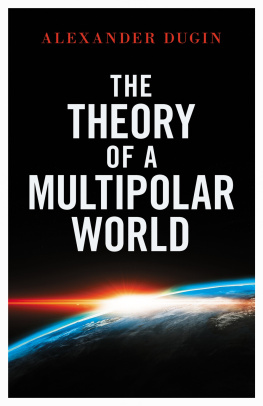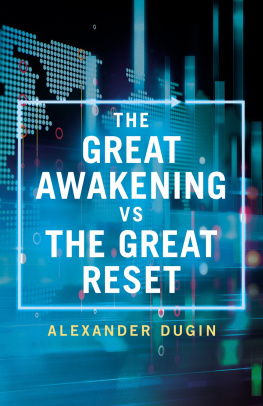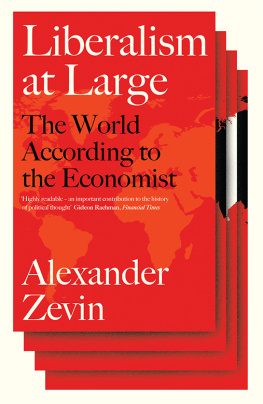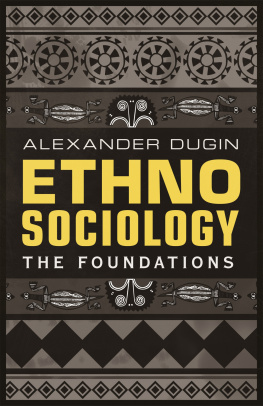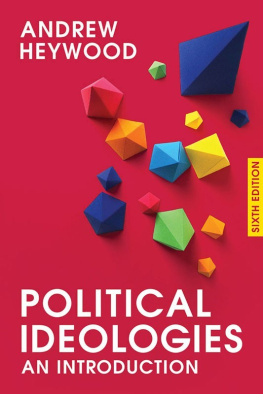The Fourth Political Theory
Alexander Dugin
The Fourth Political Theory
ARKTOS
London 2012
First English edition published in 2012 by Arktos Media Ltd.
Copyright to the English edition 2012 by Arktos Media Ltd.
All rights reserved. No part of this book may be reproduced or utilised in any form or by any means (whether electronic or mechanical), including photocopying, recording or by any information storage and retrieval system, without
permission in writing from the publisher.
Printed in the United Kingdom.
isbn 978-1-907166-65-5
BIC classification:
Social forecasting, future studies (JFFR)
Social & political philosophy (HPS)
Translation: Mark Sleboda & Michael Millerman
Editor: John B. Morgan
Proofreader: Michael J. Brooks
Cover Design: Andreas Nilsson
Layout: Daniel Friberg
ARKTOS MEDIA LTD
www.arktos.com
Table of Contents
A Note from the Editor
T he bulk of the text in this book was published as Chetvertaia politicheskaia teoriia , which was published in St. Petersburg in 2009 by Amphora. The text has been revised by the author, and additional chapters have been added to this edition from other writings by Professor Dugin which were published later, dealing with the same theme.
Unless otherwise indicated, the footnotes to the text were included by the author himself. Additional footnotes which were added by me for reference are so marked. Where sources in other languages have been cited, I have attempted to replace them with existing English-language editions. Citations to works for which I could locate no translation are retained in their original language. Web site addresses for on-line sources were verified as accurate and available during the period of March through May, 2012.
I would like to thank Alain Soral, who allowed us to use his Preface from the French edition of this book here, and also Sergio Knipe, who translated it into English. I would also like to extend my gratitude to Mark Sleboda, who spent many hours working on the translation and improving it; to Michael Millerman, who provided us with the translations for chapters 6 through 9; and to Michael J. Brooks, who proofread the manuscript. Others who volunteered their time in working on the translation were Natella Speranskaja, Zhirayr Ananyan, Nina Kouprianova, Fedor Smirnov, Valentin Cherednikov, Cyrill Lazareff, and Ivan Fedorov. I also extend my appreciation to Mark Dyal, who helped by tracking down the source of a very tricky Nietzsche quotation cited in the text.
JOHN B. MORGAN IV
Bangalore, India, May 2012
Foreword by Alain Soral: Why We Should Read Alexander Dugin
W hen the notions of Right and Left have become politically meaningless, in the West as much as everywhere else in the world; when liberals and libertarians agree on the essentials; when the three grand political theories of the Twentieth century capitalism, Communism and fascism have ultimately proven incapable of governing peoples peaceably, what is left to do?
According to Alexander Dugin, a teacher of sociology and geopolitics at the renowned Lermontov University of Moscow, and one of the most influential intellectuals in Russia, only one, radical solution remains: to devise a different approach, a Fourth Political Theory.
Conceptualising and theorising it: such is the aim of the present book.
The thought of this brilliant Moscow intellectual, which transcends our Western ideological divides and media-conditioned reactions, will not fail to surprise conformists: for it suggests that in order for us to face the future in a resolute and victorious way, we should revert to traditional forms of spirituality. According to Dugin, the primary target must be Western postmodernism: we must wage war upon this thalassocratic Empire a morbid blend of the society of the spectacle and consumer culture and its plan for ultimate world domination.
In Fourth Political Theory , Dugin shows that the only way to build a multipolar world, founded on authentic values, is to resolutely turn ones back on the Atlanticist West and its false values.
And how can this be achieved? Only by unconditionally preserving the geopolitical sovereignty of the powers of the Eurasian continent Russia, China, Iran and India which safeguard the freedom of all other peoples on the planet.
A genuine manual for cultural guerrilla warfare, Fourth Political Theory is a book that can be seen as a complement to my own Comprendre lempire (which has been translated into Russian by friends of Alexander Dugins).
Dugin in Moscow, I (and others) in Paris...while we only met for the first time in January 2011, and never consulted with one another, our ideas no doubt formulated differently agree on all the important points: from the need to unite the value-centred Right and the labour-centred Left to the imperative need for resistance against the Empire, from the appeal to Tradition as well as to many other concepts...
Once again, this shows that the only worthwhile international is that of the spirit, led by good men!
Alain Soral
(Translated by Sergio Knipe)
Introduction: To Be or Not to Be?
I n todays world, politics appears to be a thing of the past, at least as we used to know it. Liberalism persistently fought against those of its political enemies which had offered alternative systems; that is, conservatism, monarchism, traditionalism, fascism, socialism, and Communism, and finally, by the end of the Twentieth century, had defeated them all. It would be logical to assume that politics would become liberal, while all of its marginalised opponents, surviving in the peripheral fringes of global society, would reconsider their strategies and formulate a new united front according to Alain de Benoists Instead, at the beginning of the Twenty-first century, everything followed a different script.
Liberalism, which had always insisted on de-emphasising the importance of politics, made the decision to abolish politics completely after its triumph. Maybe this was to prevent the rise of political alternatives and to ensure its eternal rule, or because its political agenda had simply expired with the absence of ideological rivals, the existence of which Carl Schmitt moving to the individual and sub-individual level. It turns out that it was not only the defeated political ideologies that left the stage, but politics itself, and even liberalism, in its ideological forms, exited. This is why it became nearly impossible to imagine an alternative form of politics. Those who do not agree with liberalism find themselves in a difficult situation the triumphant enemy has dissolved and disappeared; now they are left struggling against the air. How can one engage in politics, if there is no politics?
There is only one way out to reject the classical political theories, both winners and losers, strain our imaginations, seize the reality of a new world, correctly decipher the challenges of postmodernity, and create something new something beyond the political battles of the Nineteenth and Twentieth centuries. Such an approach is an invitation to the development of the Fourth Political Theory beyond Communism, fascism and liberalism.
To move forward towards the development of a Fourth Political Theory, it is necessary to:
reconsider the political history of recent centuries from new positions beyond the frameworks and clichs of the old ideologies;
realise and become aware of the profound structure of the global society emerging before our eyes;
correctly decipher the paradigm of postmodernity;
learn to oppose not the political idea, programme or strategy, but the objective reality of the status quo, the most social aspect of the apolitical, fractured (post-) society;
and finally, construct an autonomous political model which offers a new way and a project for the world of deadlocks, blind alleys, and the endless recycling of the same old things (post-history, according to Baudrillard).

